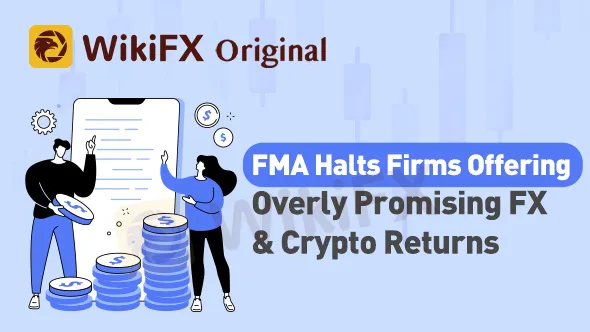简体中文
繁體中文
English
Pусский
日本語
ภาษาไทย
Tiếng Việt
Bahasa Indonesia
Español
हिन्दी
Filippiiniläinen
Français
Deutsch
Português
Türkçe
한국어
العربية
FMA Halts Firm Offering Overly Promising Returns on FX and Crypto
Abstract:The Financial Markets Authority (FMA) in New Zealand has permanently ordered the cessation of operations for Validus and its associated entities, following allegations of offering high investment returns, as the regulator continues to crack down on investment fraud.

The Financial Markets Authority (FMA), New Zealand's financial market regulator, has issued a permanent order to halt all operations of Validus and its associated entities, following a February 2023 decision upheld by the High Court after an unsuccessful appeal by the company. Validus allegedly offered clients exceptionally high investment returns and loyalty rewards, reaching 350% over a 60-week period, purportedly investing in forex, crypto, and stock markets.
As a result, the FMA has blocked Validus from offering financial products, distributing related materials, and accepting applications and funds from potential clients. The case originated from a seminar held in November 2022, during which Validus promoted its 'educational packages' known as Validus Pool.
After being issued a preliminary order to cease operations, Validus sent a letter to the FMA acknowledging the suspension of Validus Pool Products and admitting that private individuals should not invest in the offered instruments due to the unattainability of guaranteed profits.

The FMA interpreted this as confirmation that false and misleading information had been presented during the seminar, potentially misleading attendees. Paul Gregory, the FMA's Executive Director of Response and Enforcement, stated that seminar participants were induced to purchase educational packages based on false representations, and they were unlikely to receive the promised returns or be able to withdraw their money, resulting in potential financial harm.
During the November event, key speaker Suai Tito claimed that purchasers of educational packages could expect weekly returns of 2-3% and even 350% after 60 weeks, asserting that the funds were expertly invested in gaming markets, cryptocurrencies, forex, stocks, and other areas.
Gregory added that Validus had made false or misleading representations resembling an unregulated offer of financial products, leading the FMA to conclude that a stop order was the most appropriate and effective response.
Validus contested the earlier decision, and the appeal to the High Court took place in June. However, the court recently announced its decision, rejecting the appeal.
The FMA reported a 17% increase in investment fraud cases and crimes in the previous year, with 111 identified cases encompassing dishonest programs, unregistered companies, and even impostors posing as the FMA. The regulator actively investigates suspicious investment entities, as evident from recent warnings issued regarding Stake Funds and Capital Gold Investment.
In another notable case, the FMA recently concluded an investigation into Tiger Brokers, resulting in a $900,000 fine for alleged violations of the Anti-Money Laundering and Countering Financing of Terrorism Act related to events three to four years ago.

Disclaimer:
The views in this article only represent the author's personal views, and do not constitute investment advice on this platform. This platform does not guarantee the accuracy, completeness and timeliness of the information in the article, and will not be liable for any loss caused by the use of or reliance on the information in the article.
Read more

Risk Involved with Cabana Capital – Every Trader Should Know
Cabana Capital has changed its name and logo, basically everything about its identity. This seems a bit suspicious, and it's something you should definitely be concerned about. In this article, you’ll learn about the red flags that every trader needs to watch out for.

CME International Records a Massive Jump in Forex Volumes
CME International recorded a record surge in its foreign exchange trading volumes during the second quarter. Check out its performance across products and markets.

Scam Brokers Exposed! FCA Warns Traders to Stay Safe
If you are into forex trading, you need to protect your money from investment scams. Many scam brokers are active in the market now. The FCA, a reputed financial regulator, has issued a list of unlicensed brokers you need to stay away from.

Interactive Brokers Launches IBKR InvestMentor App for Beginners
Interactive Brokers introduces IBKR InvestMentor, a new mobile app delivering free, interactive investing lessons for beginners and aspiring investors.
WikiFX Broker
Latest News
Alchemy Markets Review 2025: Key Facts and Insights
Largest Market Makers
Temasek's portfolio scales new peak even as divestments hit over 2-decade high
Exposing Trade Capital Limited - Siphoning Millions, Restricting Withdrawals, Charging Extra Fees
GMI Edge: A Closer Look at Its Licenses
How Do I Place a Stop-loss Order?
5 Serious Warnings About Mirrox! You Can’t Afford to Ignore
FXPRIMUS: 5 Things They Don’t Want You to Know
Manual vs. Automated Forex Trading: Which One Should You Choose?
Mining firms lift FTSE 100 to record high after Trump confirms 50% copper tariff
Currency Calculator


